What is Tire Repair?
Tire repair refers to the process of replacing a faulty tire with a new one or simply repairing a tiny puncture. While it sounds like a job anyone with two hands can handle, it’s recommended to go to a shop that specializes in repairing tires to ensure that you get your problem solved completely.
Why You May Need Your Tire Repaired?
Years ago, car owners frequently dealt with the superfluous hassle of repairing their tires due to the quality. Thanks to the manufacturers and present day technology, tires are meant to withstand even the worst conditions on the road. While this holds much truth, it is not uncommon for people to find themselves needing to have their tire(s) repaired due to weather or other hazards on the road.
How Much Will A Tire Repair Run You?
While a tire repair won’t cost you an arm and a leg, it will cost you a bit of your time. If you’re looking into having a puncture repaired on a tire, you’re looking at spending on average between $10 to $20 dollars. The size of the puncture makes a huge difference and will determine the amount you will spend on getting your tire repaired.
Important Facts You Should Know About Tires
What Process is Used When Repairing a Tire?
A tire plug is exactly what it sounds like; a sticky expandable plug that is inserted into the puncture in hopes of keeping the injury secure long enough for the tire to re-inflate with air.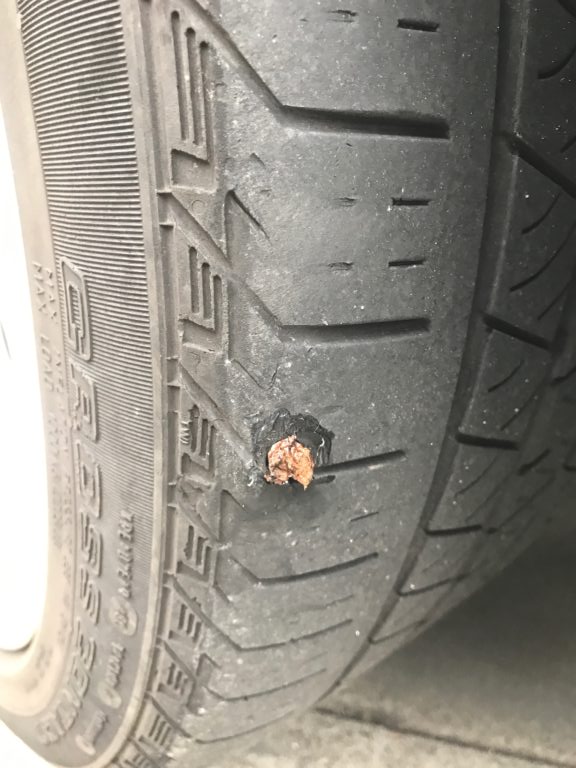 A patch is also pretty self-explanatory when it comes to description. Better known as a radial patch, this piece of material is used to seal up the damaged tire. Due to the heat caused by driving, the patch eventually melts into the tire completely erasing all notices of repair.
A patch is also pretty self-explanatory when it comes to description. Better known as a radial patch, this piece of material is used to seal up the damaged tire. Due to the heat caused by driving, the patch eventually melts into the tire completely erasing all notices of repair.
Most vehicles are equipped with a spare tire if you happen to be running on a flat. In some cases, you might have to go to your local car shop to purchase a tire depending on the circumstances.
The Difference Between a Plug and a Patch
While the plug takes less time and can be down without removing the entire tire in comparison to the plug, it’s more likely for a car owner to come back in a shorter amount of time for yet another repair after getting a plug opposed to a patch.
Sources:
http://www.tirereview.com/back-to-basics-1-basic-tire-repair/
https://www.carsdirect.com/car-repair/average-tire-puncture-repair-cost
http://txtire.com/blog/view/fixing-flat-tires-tire-plug-vs-radial-patch
Your Name (required)
Your Email (required)
Phone (required)
What is the best way to reach?
Phone
Email
Tire patches are a huge money maker for auto shops.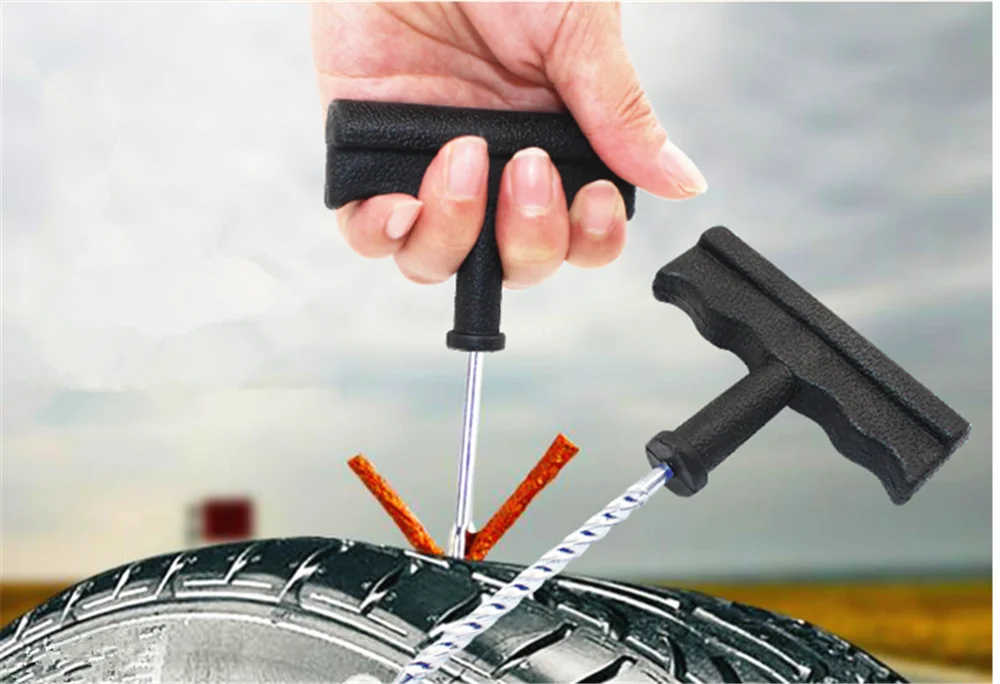 They don’t require much labor, and the cost of a patch is really low compared to most other auto parts.
They don’t require much labor, and the cost of a patch is really low compared to most other auto parts.
But what is a good price to pay to get a tire patched? Well, that depends. If you patch the tire yourself, expect to spend $6.00. If you take it to the shop, you’re looking at spending anywhere between $10-$40, depending on the situation.
Patching tires yourself is always everyone’s first instinct, since the cost is so low. But many people are deterred when they find out they can’t, due to any number of reasons. Deciding when to do it yourself, versus taking it to the shop is what we’ll explore in this article along with why tire patches can be so pricey. We’ll outline the different reasons you should, or shouldn’t do it yourself. We’ll also examine the different types of patches and the pros and cons of each.
I used to work at a shop on a main highway. Every day, during rush hour traffic, at least 3 customers came in requesting a tire patch. Over the years, I’ve learned the simplicity of the tire patch can be deceiving.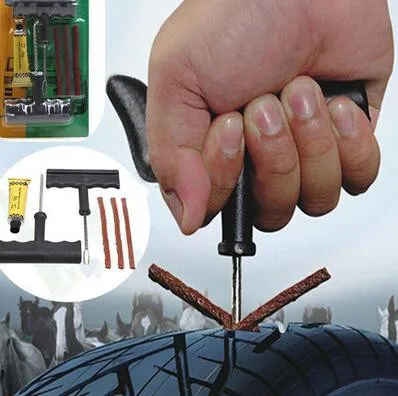 Not all tires are created equal and the same goes for patches.
Not all tires are created equal and the same goes for patches.
When a shop patches your tire, most of the cost stems from the mechanic’s time.The wholesale price of a tire patch is less than $2.00. The glob of bead sealer that’s used to seal the patch costs less than $0.10.
But it takes the average mechanic about 15 minutes to patch a tire. Most shops charge around $120 per mechanic hour, so you’re looking at $30-$40 for time and parts. If you want the tire re-balanced, as is recommended, tack on another $13.00.
While a tire patch is among the most simple jobs, it takes time away from mechanics who could be working on higher paying, more demanding jobs. Hence, the hourly rate being applied to the job.
Not all tires can be repaired. There are some tests that mechanics, or you yourself, can perform. Doing these tests will give you a good idea as to whether or not your tire can be repaired.
When your tire becomes flat, the first thing to do is not drive on it. Driving on a flat tire, even for a short amount of time, can damage it beyond repair. When a tire is operated without air, the vehicle’s weight crushes the tire’s innards turning it to dust.
Driving on a flat tire, even for a short amount of time, can damage it beyond repair. When a tire is operated without air, the vehicle’s weight crushes the tire’s innards turning it to dust.
The next thing to do is see what caused the flat. Nails directly in the middle of the tread are a common occurrence. They can be easily spotted from a distance. If you can’t see it, running your hand around the tread will reveal the location of the nail.
Tire punctures that occur within 2 inches of the sidewall are considered non-repairable. This means neither you, nor the shop, can repair this.
It’s actually against the law for auto-shops to repair tires that have punctures close to the side wall. The issue is, tire patches placed close to the side-wall often result in tire blowouts, due to the shifting nature of a tire’s sidewall to tread relationship.
A good test to measure the distance between the puncture and the sidewall is to place your thumb in that space. If the puncture is a thumbs width (or more) away from the side wall, you’re in the clear.
If the puncture is a thumbs width (or more) away from the side wall, you’re in the clear.
If not, sadly, it’s time for a new tire.
The length of the puncture is the next thing to look at. Most nail punctures are just as wide as the nail itself. In this case, with the puncture being so small, it’s ok to plug the tire yourself. But if the length of the puncture is 2 ½ inches or more, you cannot patch it.
You cannot patch it, or a shop cannot either. Punctures this large are not repairable, because patches aren’t meant to hold in air over that big of an area.
The inner tire liner doesn’t become fully sealed, even with the largest patches available. If your puncture is more of a gash in the tread, it’s time for a new tire.
Fully patching a tire requires you to complete the following steps.

So as you can see, the full, official way to patch a tire is quite involved. This is why you can see prices up to $45.00 for a simple patch.
If the tire has to be rebalanced, that’s around $13.00 and if it needs new valve stems, or a TPMS sensor, this can also tack on extra costs.
This patch is so effective that it saves you from having to purchase a new tire. You can enjoy the full length of the tire as if no puncture ever happened. Patching a tire can be quite the life saver when you’re in a jam.
The obvious issue here is that tire machines aren’t commonplace in the average driver’s house. So doing it yourself this way isn’t really feasible, but the method we discuss next can be done almost anywhere.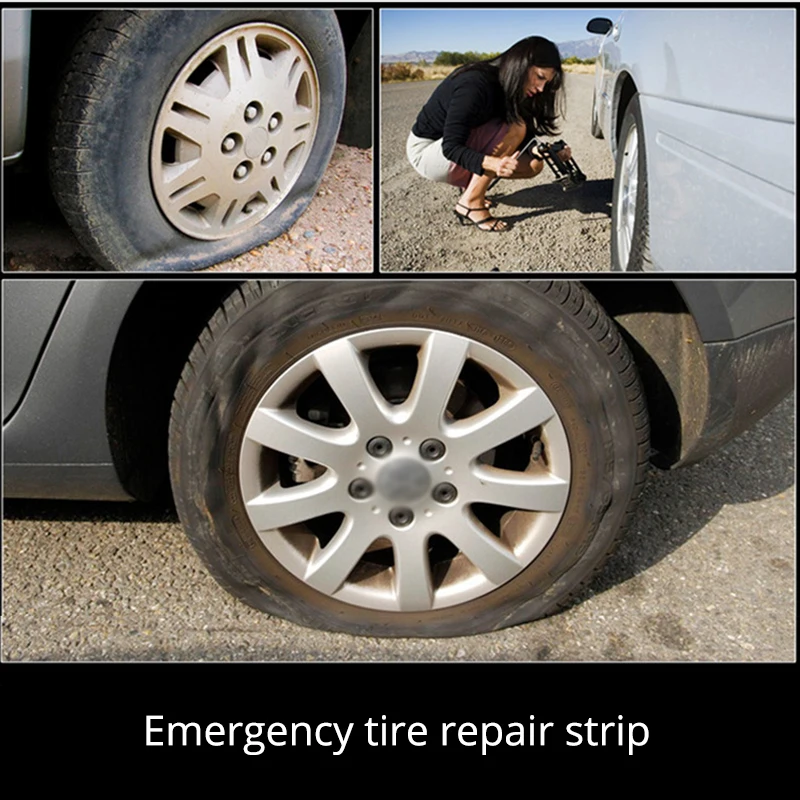
Tire plugging is a simple fix applied to various types of tire punctures. The majority of tire punctures can be repaired by doing a plug yourself.
To plug a tire, just push the plugging strip with the T-Handle in as far as it will go. Then, with all your might, quickly pull the t-handle out. This will plug the tire, and all that’s left is for you to cut the excess plugging strip away.
Tire plugging is looked down by Tire Shops because they consider it not fully seal the surface. But I’ve plugged well over 500 tires, and have never had an issue. Most independent shops are fond of tire plugging as well, since it keeps prices down for them, and the customer.
Tire plugging can be done by yourself, in your driveway. If you don’t feel comfortable doing it, call up an independent shop and ask if they plug or patch tires. Most likely, they probably offer both, but they’ll charge half for a plug, compared to what they would for a full patch.
Plugging tires, while usually a simple task, can turn into a complex issue.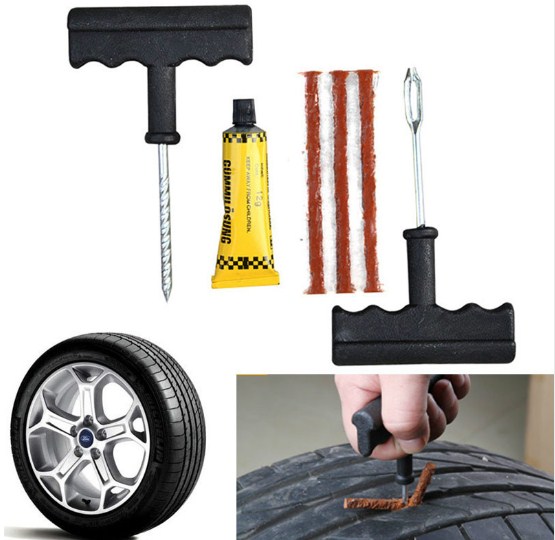 For example, if you plug a tire, and you can still hear a slow hissing noise, it can be a pain to hunt down the source of the leak.
For example, if you plug a tire, and you can still hear a slow hissing noise, it can be a pain to hunt down the source of the leak.
Or if you spray the whole tire down with soap in order to locate the leak, and can’t find it. You might start to question your sanity. Don’t! These issues can take up hours, even for master techs.
There’s actually a machine in some tire shops that puts the tire under water using a crane-like object from above. Even this machine still fails sometimes, and mechanics are left scratching their head. So if you start to encounter any issues of locating the leak, or plugging a leak, it’s time to take it to the shop.
If the tire is totally flat when you walk out to your car, you should be able to use your spare tire, and repair the issue at home with a plugging kit. But if you plug the tire, and it’s still leaking, take it to the shop and let them repair it.
If you are questioning the length test or edge test results, it’s also recommended that you take it to the shop.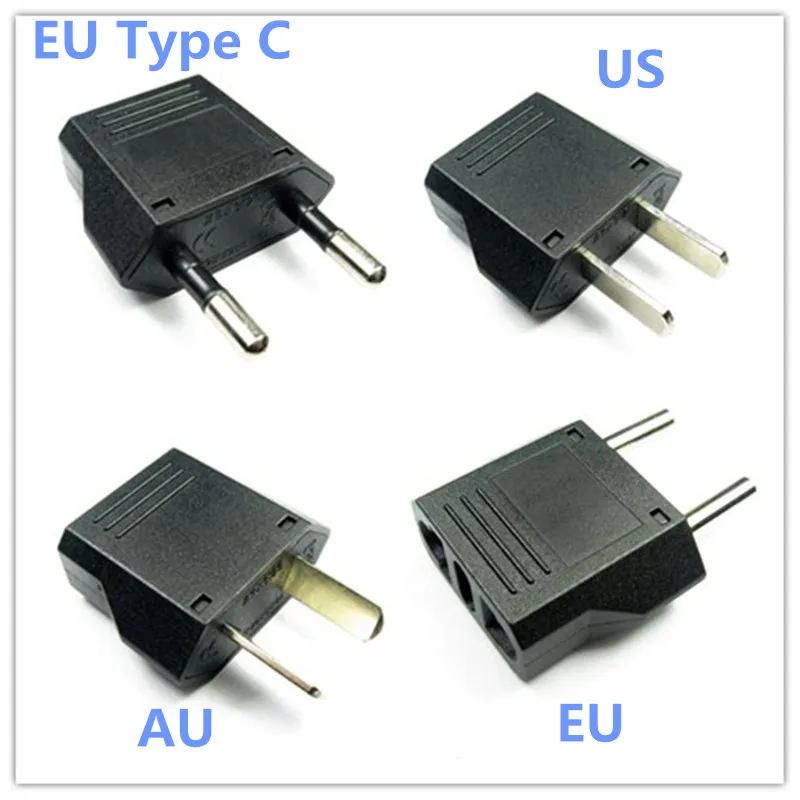 Some mechanics will say, “use double the amount of plugs”, to fix large gashes. This is wrong. If one plug can’t fix it, take it to the shop and see what you can recoup.
Some mechanics will say, “use double the amount of plugs”, to fix large gashes. This is wrong. If one plug can’t fix it, take it to the shop and see what you can recoup.
But for the majority of situations, where a nail has punctured your tread somewhere in the middle of the tread face, it’s totally acceptable to purchase a plug kit, and do the repair yourself. It will save you a couple bucks, and you will have had the opportunity to go under your car to do a quick visual inspection. Or take off the tire and glance at the brake pads.
Dear Clients! In connection with the current situation, we ask you to check the current prices for products with your personal managers. Thank you for your understanding and cooperation!
 fuses (fuses) HRC
fuses (fuses) HRC home >Electrical equipment >Shields and cabinets, bus duct >Busbar systems >Phase bus (bus wiring) >IEK >Connecting bar type FORK (plug) 3P 100A (length 1 m) | YNS11-3-100 IEK (IEK) (#559471)
| Designation | Availability | Price wholesale with VAT | Update date | Add to cart | Delivery time |
|---|---|---|---|---|---|
| Bus connecting FORK plug 3p 100A (dl.1m) IEK YNS11-3-100 | 366 | 2 850.12 R. | 05.11.2022 | From 1 day | |
| Bus connecting type FORK (plug) 3-phase (1m) 100A - YNS11-3-100 | On order | 2 850.12 R. | 04.11.2022 | From 30 days | |
| Bus connecting type FORK (plug) 3P 100A (dl.1 m) | YNS11-3-100 | IEK | On order | 2 850.12 R. | 05.11.2022 | From 30 days | |
| ... ... ... ... ... ... ... ... ... ... | |||||
Buy connecting busbars type FORK (plug) 3P 100A (length 1 m) | YNS11-3-100 IEK (IEK) can individuals and legal entities, by bank transfer and cash, Shipment is made from the point of issue on the next day after receipt of payment.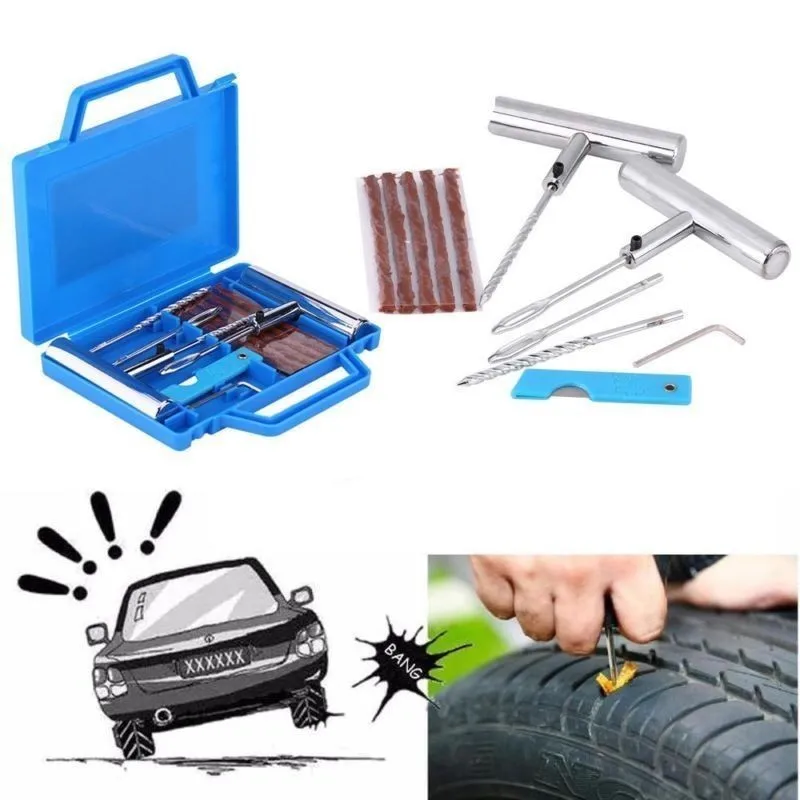
Price of connecting rail FORK type (fork) 3P 100A (length 1 m) | YNS11-3-100 IEK (IEK) plug 3p depends on the total amount of the order, the wholesale price is indicated on the website.
We will deliver connecting bus type FORK (plug) 3P 100A (length 1 m) | YNS11-3-100 IEK (IEK) the next day after payment, in Moscow and within a radius of 200 km from the Moscow Ring Road, to other regions of the Russian Federation we ship transport companies.
Similar products
| Connecting rail, type FORK for 3-ph loading. 100A 54 mod. EKF PROxima | fork-03-100 | 23 | $2,752.00 | |
| Three-pole connecting bar 100A FORK (plug) 1m - SQ0802-0015 TDM ELECTRIC | On request | $1,495.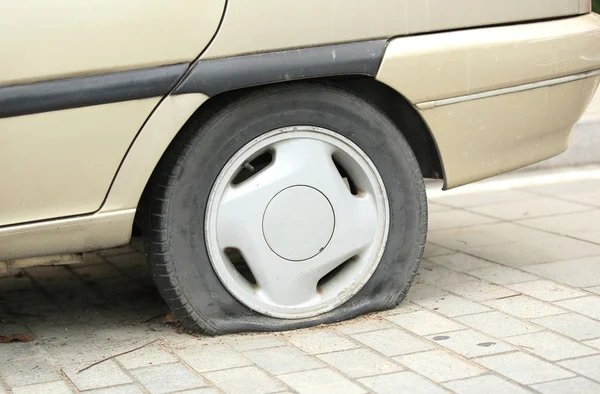 41 41 | |
Related products
| Automatic three-pole switch BA47-60 25A C 6kA | MVA41-3-025-C IEK MVA31-3-025-C | 448 | 663.12 p. | |
Dear Clients! In connection with the current situation, we ask you to check the current prices for products with your personal managers. Thank you for your understanding and cooperation!
 fuses (fuses) HRC
fuses (fuses) HRC home >Electrical equipment >Shields and cabinets, bus duct >Busbar systems >Phase bus (bus wiring) >IEK >Connecting bar type FORK (plug) 3Р 63А (length 1 m) | YNS11-3-063 IEK (#559472)
| Designation | Availability | Price wholesale with VAT | Update date | Add to cart | Delivery time |
|---|---|---|---|---|---|
| Bus connecting type FORK (plug) three-phase 63A (1m) - YNS11-3-063 | 972 | 1 200.67 R. | 05.11.2022 | From 1 day | |
| Bus connecting FORK plug 3p 63A (dl.1m) IEK YNS11-3-063 | On order | 1 200.67 R. | 05.11.2022 | From 30 days | |
| Bus connecting type FORK (fork) 3P 63A (dl.1 m) | YNS11-3-063 | IEK | On order | 1 200.67 R. | 05.11.2022 | From 30 days | |
| ... ... ... ... ... ... ... ... ... ... | |||||
Buy connecting busbars type FORK (plug) 3P 63A (length 1 m) | YNS11-3-063 IEK (IEK) can individuals and legal entities, by bank transfer and cash, Shipment is made from the point of issue on the next day after receipt of payment.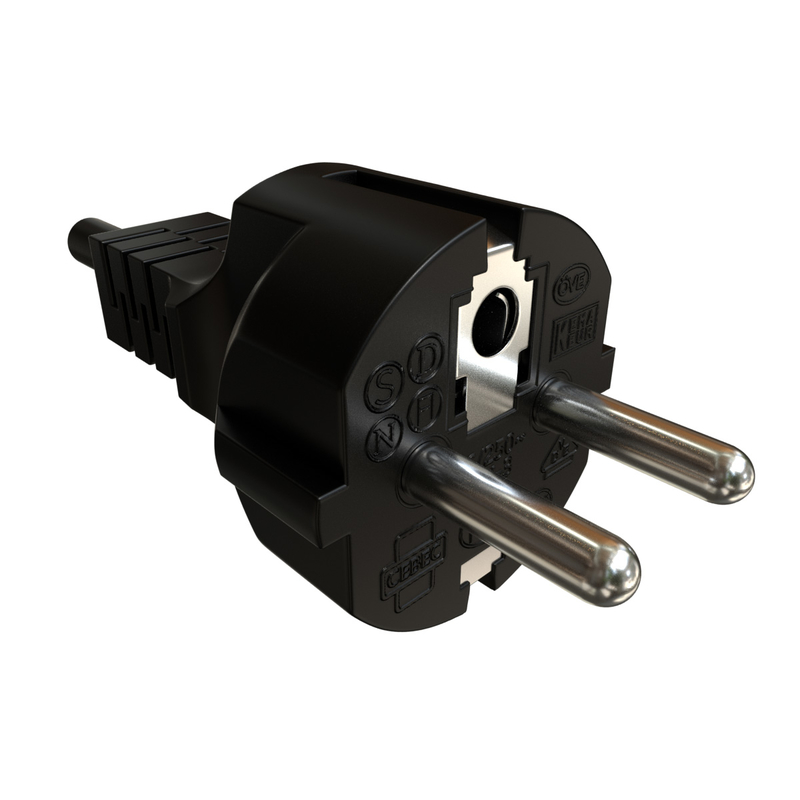
Price of connecting rail FORK type (fork) 3Р 63А (length 1 m) | YNS11-3-063 IEK (IEK) plug 3p three-phase depends on the total amount of the order, the wholesale price is indicated on the website.
We will deliver connecting bus type FORK (plug) 3Р 63А (length 1 m) | YNS11-3-063 IEK (IEK) the next day after payment, in Moscow and within a radius of 200 km from the Moscow Ring Road, to other regions of the Russian Federation we ship transport companies.
Similar products
| Three-pole connecting bar 63A FORK (plug) 1m - SQ0802-0011 TDM ELECTRIC | On request | $747.86 | |
| Connecting rail, type FORK for 3-ph loading. |